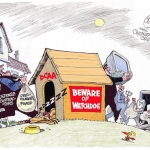Latest Articles
The donation to the Proposition 23 campaign comes from a subsidiary of Kansas-based Koch Industries, which owns refineries and controls 4,000 miles of oil pipelines.
Read MoreMilitary auditors failed to complete an audit of the business systems of Ohio-based Mission Essential Personnel even though it had billed for $1 billion worth of work over the last four years, largely done in Afghanistan.
Read MoreAlmost a decade after the "War on Terror" began, a bipartisan U.S. Congressional commission spent two days cross-examining witnesses to see if the outsourcing of private security has been a terrible mistake.
Read MoreThis week, almost a decade after the U.S. "War on Terror" began, the Commission on Wartime Contracting held two days of hearings into the role of private contractors in conducting and supporting war. The Congressional witness table included Aegis, DynCorp and Triple Canopy. Curiously, Blackwater was not called; and the CEO of Torres Advanced Enterprise Solutions failed to appear.
Read MoreOriginally posted on June 1 on The Huffington Post.
The bracing reality that America has two sets of rules -- one for the
corporate class and another for the middle class -- has never been more
indisputable.
With 606 oilfields, the Niger delta supplies 40% of all the crude the United States imports and is the world capital of oil pollution. More oil is spilled from the delta's network of terminals, pipes, pumping stations and oil platforms every year than has been lost in the current BP/Transocean oil spill in the Gulf of Mexico.
Read MoreHow much money did Charles G. Taylor, the deposed president of Liberia, siphon out of his war-shattered country, and where is it? Investigators are developing a new strategy involving filing civil damage claims against companies, governments and international banks that they contend aided Mr. Taylor in illegal transactions.
Read MoreHow much money did Charles G. Taylor, the deposed president of Liberia, siphon out of his war-shattered country, and where is it? A review by the International Herald Tribune of court transcripts, bank records, and newly available government receipts and confidential prosecution memos show, for example, how the country's largest timber company sent tax payments to Mr. Taylor's private account rather than the national treasury.
Read MoreThe Nature Conservancy faces a problem: a potential backlash as its supporters learn that BP and the world's largest environmental organization long ago forged a relationship that has lent BP an Earth-friendly image and helped fund the Conservancy. The crude emanating from BP's well threatens to befoul a number of alliances between energy conglomerates and environmental nonprofits.
Read MoreMore than a month has passed since the Deepwater Horizon rig blew up, spewing oil into the Gulf of Mexico and frustrating all efforts to contain it. The disaster underscores the enduring laxity of federal regulation of offshore operations and has shown the government to be almost wholly at the mercy of BP and of Transocean, the company leasing the rig.
Read More